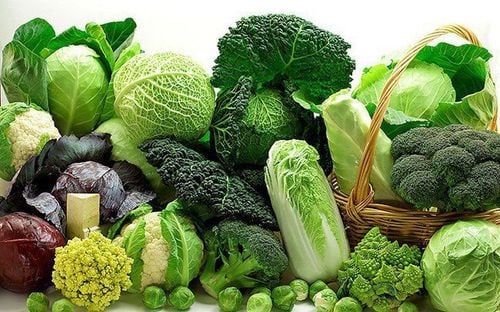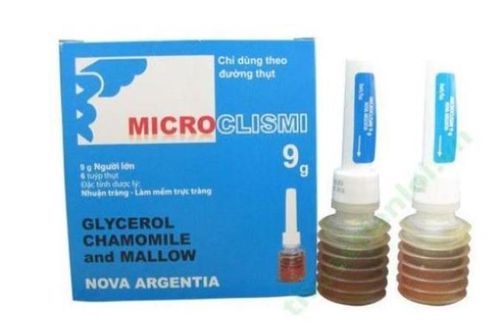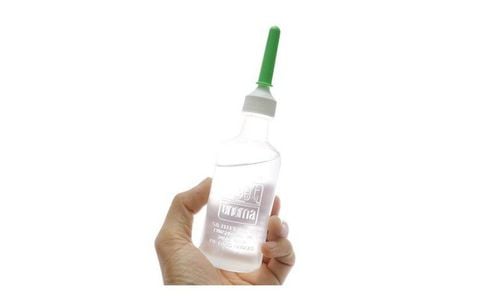This is an automatically translated article.
Constipation is one of the extremely common digestive problems. This condition can be caused by a poor diet, lifestyle, medication use, or other medical conditions. If not treated early constipation can greatly affect the quality of life as well as the general health of the patient.
1. Make sure to provide enough water for the body
When the body is often dehydrated, it can lead to constipation. Therefore, to prevent the risk of constipation, you should focus on providing and keeping enough water for the body.
Constipation can be relieved when you quickly rehydrate the body, such as drinking carbonated water. Some researchers have found that carbonated water can reduce symptoms of constipation more than tap water. In particular, it is also very suitable for use by people with indigestion, or people with chronic idiopathic constipation (CIC).
However, you should not choose carbonated drinks that contain a lot of sugar, such as soft drinks, because these drinks often have potential health risks and can even make your mood worse. your constipation becomes more severe.
Some patients with irritable bowel syndrome (IBS) have reported that their symptoms not only did not seem to improve but also showed signs of worsening after they drank carbonated drinks high in sugar. To limit the negative effects of carbonated water on your health in general and on your constipation in particular, you should become a wise consumer in choosing healthy drinks. health, for example drinking carbonated natural mineral water.

Bệnh táo bón có thể giảm nhẹ hơn khi bạn nhanh chóng bù nước cho cơ thể
2. Add more soluble fiber to cure constipation
Health care professionals often recommend that patients with constipation should increase fiber intake through daily nutrition to cure constipation.
In fact, providing a large amount of fiber to the body will help increase the consistency and volume of bowel movements, thereby making it easier for you to have a bowel movement. The results of a 2016 study showed that more than 70% of patients with chronic constipation had very positive signs of improvement when adding fiber from their daily diet. However, there are also some conflicting opinions from others. They found that increasing their intake of fiber made their constipation worse than before because dietary fiber only improved bowel movements, but did not relieve them. symptoms of constipation, including abdominal pain, dry hard stools, and bloating.
This stems from adding different types of fiber for each patient, meaning that each type of fiber will have a unique effect on digestion. In general, fiber is divided into 2 main categories, including soluble fiber and insoluble fiber. Soluble fiber is commonly found in barley, oats, beans, lentils, peas, nuts and some other fruits. They have the ability to absorb water and form a mixed gel, which improves stool consistency and softens stools. Meanwhile, insoluble fiber is found in abundance in vegetables, wheat bran and some whole grains. This type of fiber helps stool move faster and easier through the body's digestive system.
Nutritionists say, soluble fiber is a great choice for people who are being treated for constipation, because they are not fermentable, such as psyllium. Research has revealed that using psyllium is 3.4 times more effective in treating constipation than insoluble wheat bran. However, there are also some types of soluble fiber that are fermentable and not effective in treating constipation, because they have been fermented by the bacteria in the gut and lost their ability to hold water.
As for insoluble fiber, they also have different effects on the treatment of constipation. Some people with bowel function problems, such as chronic idiopathic constipation or IBS find their constipation worsened by consuming insoluble fiber.
To prevent constipation, you should consume a balance between soluble fiber and insoluble fiber. Generally, the recommended total daily fiber intake is 38g for men and 25g for women.
3. Increase exercise
Many studies have shown that increasing exercise can help you improve the uncomfortable symptoms of constipation and make bowel movements easier.
In particular, patients with IBS should practice moderate exercise, such as brisk walking, swimming or cycling, which can improve digestive symptoms as well as quality of life. . However, you should limit vigorous exercise, such as jogging, as they can make symptoms of constipation worse in certain cases.
4. Drink coffee
Some people feel that after drinking coffee, they feel more like going to the toilet. In fact, this is because coffee contains caffeine, which stimulates the muscles in the digestive system.
Research has found that drinking caffeinated coffee can stimulate digestive muscles 60% more strongly than drinking plain water, and about 23% more than drinking decaffeinated coffee. In addition, coffee also contains a small amount of soluble fiber, which improves the balance of bacteria in the intestines and prevents constipation.
However, caffeine may not be good for people with irritable bowel syndrome, as it can worsen digestive symptoms. Therefore, IBS patients should eliminate caffeine from their diet.

Bệnh nhân mắc chứng táo bón nên tăng cường bổ sung chất xơ thông qua chế độ dinh dưỡng hàng ngày
5. Use Senna . herbal laxative
Senna herbal laxative is recognized as safe and effective in curing constipation. This type of laxative contains plant compounds called glycosides, which stimulate the nerves in the intestines and speed up bowel movements.
Although Senna is considered safe for adults for short-term use, you should still consult your doctor if after a few days of taking the medicine there is no improvement in your symptoms. . In addition, pregnant women, women who are breastfeeding, or people with inflammatory bowel disease should not use Senna to avoid the potential side effects it causes.
6. Probiotic Supplement
Probiotics is a type of beneficial bacteria that live in the intestinal tract, which has the ability to prevent chronic constipation. These usually include Lactobacillus and Bifidobacteria. You can get these beneficial bacteria through probiotic foods like sauerkraut, yogurt or kimchi.
For some patients with chronic constipation there may be an imbalance between the bacteria living in the intestinal tract. Therefore, consuming a variety of foods containing probiotics will contribute to improving this imbalance and preventing constipation from occurring.
A recent review found that taking probiotics for 2 weeks can help treat constipation, increase stool consistency and frequency. In addition, their ability to treat constipation also stems from the production of short-chain fatty acids, which improve bowel movements and make bowel movements easier.
7. Use of laxatives
Depending on the condition of constipation, each person will choose a laxative that is right for him, because laxatives are often different in how they work, but they all have a certain effect on the disease. constipation.
Here are some of the most common types of laxatives, including:
Bulk laxatives: These are drugs with fiber, which help increase the water content of the stool. Stool softeners: An oil-based laxative that makes stools softer and easier to pass through the intestines. Osmotic laxatives: Helps soften stools by pulling water from surrounding tissues into the digestive system. Stimulant Laxatives: Helps increase bowel movements by stimulating the nerves in the intestines. If you are planning on choosing any of these medications for your long-term constipation, you should consult with your doctor to find out which medication will work best for you.
8. Adopt a Low FODMAP Diet
In fact, constipation is a common symptom of irritable bowel syndrome (IBS). Therefore, nutritionists recommend that patients with constipation and IBS should adopt a low-FODMAP diet, as it not only helps in treating IBS syndrome but also improves related problems. constipation.FODMAP stands for oligosaccharides, disaccharides, monosaccharides and fermentable polyols. This diet generally recommends limiting the consumption of high-FODMAP foods for a certain period of time before reintroducing them in the daily diet. This is to determine which foods your body can tolerate.
For people with IBS-C (or constipation) just following the low FODMAP diet is not enough. They need to pay attention to many other aspects of the diet, such as adding enough fiber and water to relieve symptoms of the disease.

Một số người cảm thấy sau khi uống cà phê, họ có cảm giác muốn đi vệ sinh hơn
9. Supplemental glucomannan
Glucomannan is a type of soluble fiber, extracted from the roots of the Konjac plant. It is considered an effective solution in preventing constipation.According to research, glucomannan helps improve intestinal motility, while balancing the beneficial bacteria in the intestinal tract due to the mechanism of action like a prebiotic. You can get this soluble fiber from supplements, or eat noodles, konjac, and shirataki.
10. Eat prebiotic foods
Prebiotics are a type of carbohydrate fiber that is difficult to digest, consisting of inulin and oligosaccharides. This type of fiber helps improve the health of the digestive system by strengthening the beneficial bacteria in the gut and improving the balance of the intestinal flora. And yet, prebiotics also increase the frequency of bowel movements and help soften stools.
You can get prebiotics through foods like Jerusalem artichokes, garlic, leeks, chicory, bananas, onions and chickpeas.
11. Magnesium Citrate Supplement
Magnesium citrate is an over-the-counter osmotic laxative that is very effective in treating constipation.
Generally, you should only take moderate amounts of magnesium supplements to relieve symptoms of constipation. For surgeries, doctors will use them in higher doses to help clear the bowels before the patient begins surgery.
12. Eat prunes
Prunes are considered a natural solution to help cure constipation effectively. The reason, in prunes not only contains fiber but also includes sorbitol - a sugar alcohol with laxative effect. Even the fiber in prunes is more effective than other fiber like psyllium.
You should use an average of about 7 plums (corresponding to 50g) twice daily to improve the symptoms of constipation. However, the sugar alcohols found in prunes are in the high FODMAP food category, so it may not be suitable for people with IBS.
13. Avoid using milk
People who are intolerant to milk, including adults who are lactose intolerant and children who are intolerant of cow's milk proteins, should use them with caution, as it can affect bowel movements and cause constipation.
For the above cases, it is advisable to remove milk from the diet, and at the same time increase the intake of calcium-rich foods to improve the symptoms of constipation.
In case many ways to cure constipation have been applied but it is not effective, the patient should go to the hospital to be examined and effectively treated by a specialist. Currently, Vinmec International General Hospital is one of the prestigious hospitals, trusted by a large number of patients for medical examination and treatment. Not only the physical system, modern equipment: 6 ultrasound rooms, 4 DR X-ray rooms (1 full-axis machine, 1 light machine, 1 general machine and 1 mammography machine) , 2 DR portable X-ray machines, 2 multi-row computer tomography rooms with receivers (1 machine 128 rows and 1 machine 16 rows), 2 rooms for magnetic resonance imaging (1 machine 3 Tesla and 1 machine 1.5 Tesla), 1 room for 2 level interventional angiography and 1 room for bone mineral density.... Vinmec is also the place to gather a team of experienced doctors and nurses who will greatly assist in the diagnosis and detection. early signs of abnormality of the patient's body. In particular, with the space designed according to hotel standards, Vinmec ensures to bring the patient the most comfort, friendliness and peace of mind.
Please dial HOTLINE for more information or register for an appointment HERE. Download MyVinmec app to make appointments faster and to manage your bookings easily.
Reference source: medicalnewstoday.com












